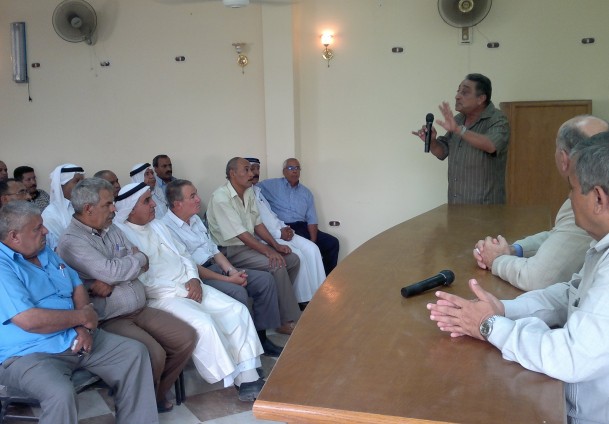By Sally Sami
A friend of mine and former colleague keeps reminding me how I woke him up one morning in June 2010 when pictures of Khaled Saeed were posted on Facebook, telling him that this case would be a ground-breaking case. True, the Khaled Saeed case, the movement that followed, and his family’s determination to make it a national cause against torture were big leaps towards the revolution.
It was no surprise then that youth called for major protests on 25 January marking national police day. It was a revolt against police impunity; against torture and abuse. One would have thought if we would get anything out of the revolution, it would be true security reform, accountability and an end to torture in detention centres, including police stations. After all it was a revolution against torture and police corruption.
Sadly enough, torture did not end with the stepping down of Mubarak. We have seen massive abuses by the military police. No one was held accountable for the abuse and torture. Those tried were found not guilty, despite civilian court orders to end abuses such as virginity tests.
With the election of Mohamed Morsy and despite any ideological differences, one would have expected that those who have claimed with pride their participation in a revolution that was instigated against police abuse would first adopt strong policies to ensure security reform and an end to impunity. So far we haven’t seen any steps towards this; only the possibility of passing a new emergency law that would yet again give more power to the security apparatus instead of finding ways for more civilian control.
Yes, torture in police stations has continued, even after Morsy assumed the presidency. As we speak, there are two men being daily abused and tortured in Shebin El Kom (Monoufiya) police station, after they were arrested on 13 September for verbally quarrelling with police officers at a traffic checkpoint.
They were beaten, had their legs tied and were dragged across two streets. At the police station, they were dragged again in the same manner and even down stairs. The two brothers remain in detention. Their family have submitted complaints to the general prosecutor for intervention. Until now, no steps have taken place to investigate abuses at the Shebin El Kom Police Station.
Around the same time, two men were killed by the police in Meet Ghamr (Dakahliya). The first was tortured to death within the police station and the other shot dead outside the station. The Egyptian Initiative for Personal Rights has adopted the case and published a comprehensive report on the abuses that were committed.
On 16 September, the police went on a violent eviction campaign against any unlicensed shops and coffee shops, attacking individuals and breaking property, which led to tension between citizens and the police. Several individuals were arrested. One coffee shop owner was beaten and wanted to submit a complaint. She was accompanied by Atef El Meneesy. At the police station he was beaten to death.
Other detainees were beaten as well. With tension rising in front of the police station, the police used live ammunition to disperse the crowd, killing one. Lawyers of the victims and families have submitted complaints to the general prosecutor and an investigation has been opened into the incident.
Despite this, police officers accused of intentional murder and torture have not been suspended and remain in their position; having access to evidence to tamper with it and the ability to use their power to influence witness statements.
Had there been more space, I would have written about other cases in Sohag, Cairo and several other governorates where police continue to abuse their power, torture citizens, and kill. So as we approach Morsy’s 100 days, it is important to ask him what has been done to end torture and police impunity in Egypt? It is also important to remind him that this revolution that brought him to power was a reaction to continuing and increasing police corruption.
Serious steps need to be taken towards genuine security and justice reform. Mechanisms for civilian monitoring of police stations need to be discussed and set in place.
Laws need to be revised, including a definition of torture that meets international standards. Justice and protection of victims and witnesses need to be a priority. Today, we only hear of the importance of re-instating the emergency law. I think it is time to think differently. If this government is true about human rights and the revolution’s aspirations, we need to hear more from our justice minister what steps the ministry is taking to ensure justice and more accountability of the security apparatus.




